
Cary Grant, Christmas and comedy
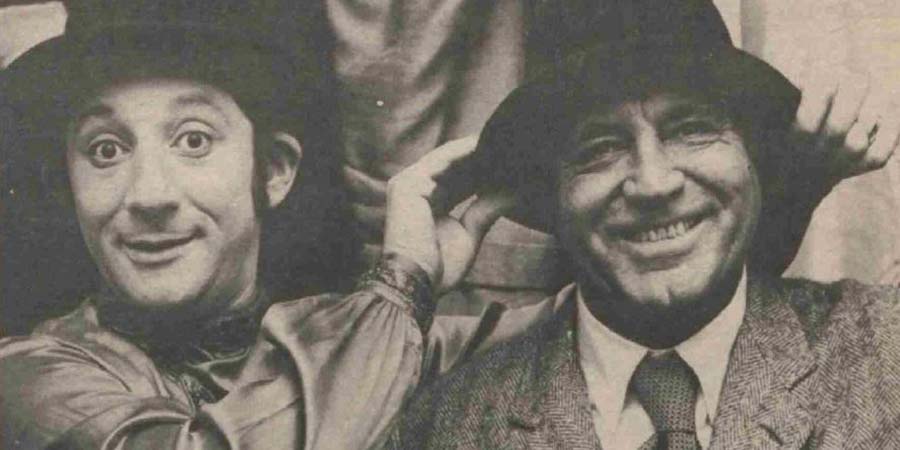
One of the traditional features of the festive season in Britain is the pantomime, but, if you lived in Bristol at any time from the late 1940s through to the early 1970s, you did not just expect the pantomime. You also expected Cary Grant.
Cary Grant adored pantomimes, and he particularly enjoyed seeing them in his birthplace of Bristol. No matter how long he had lived in America as a Hollywood star, growing increasingly tanned and transatlantic, he never lost his love for this most British of entertainments, as well as his affection for many of the British comedians who starred in them.
Pantomime illuminated the first part of his life when he was an ordinary working class boy named Archie Leach. It entranced him as a child, when his father took him to see them each Christmas. It fascinated him as a teenager, when, as part of his training with an acrobatic troupe, he was taught the more technical aspects of what he later termed its 'fine art'.
Even after he had moved to America, changed his name to Cary Grant and commenced his ascent to international movie stardom, he never lost his love of British humour in general, and pantomime in particular.
He devoured whatever British comedy that he could find on the other side of the Atlantic: as soon as he could afford to arrange it, for example, special acetate recordings of BBC radio shows would be sent over to him for his special collection, and, in 1938, during a brief visit to Britain (he was actually, surreptitiously, on one of his first anti-Nazi spying missions via the film producer and British intelligence agent Alexander Korda), he took great pleasure in bounding into Broadcasting House to appear alongside Arthur Askey and Richard Murdoch in an edition of one of his favourite humorous series, Band Waggon.
Many years later, when he had retired from acting, he relished having more time to consume the comedy of his mother country. He was known to be an avid fan of such sitcoms as Hancock's Half Hour and Steptoe And Son, the tapes and videos of which he would have imported, along with boxes of his beloved Lion chocolate bars, to his home in Beverly Hills.
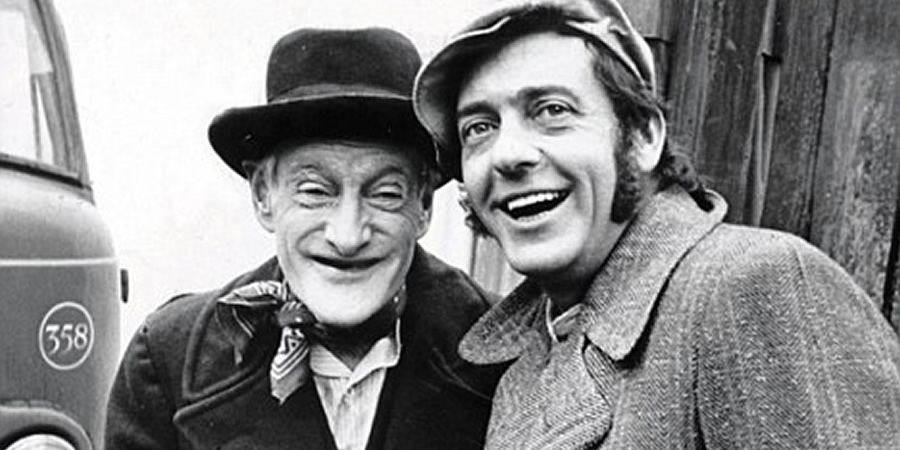
He was also quick to make contact with those British comics he most admired whenever they ventured over to America, establishing friendships with the likes of Peter Sellers and Dudley Moore, and doing his best to open doors on that side of the Atlantic for the benefit of Norman Wisdom and Benny Hill. Indeed, in his own quiet but kind-hearted way, he had long been an unofficial patron of such performers, pulling whatever strings he could to heighten their status in the States.
Sid Field, the gloriously droll character comedian from Birmingham, was a particular favourite, and so, when Field came over for a brief visit in 1948, Grant helped organise a special dinner in his honour at the Hollywood Masquers Club, attended by the likes of Bob Hope, Jack Benny and Danny Kaye. One of the features of the evening was a set of comedy routines performed by the stars themselves, and Grant chose to appear (as 'Archie Leach') in a slapstick sketch that involved him being drenched in water and whitewash and hit with a succession of custard pies. It was the kind of basic but carefully choreographed comic business that he remembered seeing on the English stage, and he was in his element bringing it back to life.
There had actually once been a moment, about a decade earlier, when he came close to emulating his old English heroes by appearing in a pantomime himself. Metro-Goldwyn-Mayer studios planned to make a movie version of Cinderella and Grant, much to his delight, was pencilled in to play one of the Ugly Sisters alongside Fred Astaire, with Mickey Rooney appearing as Buttons. The project, however, collapsed due to the difficulties of negotiating with the multiple other studios who had key cast members under contract, and Grant's dream of playing a dame was dashed.
He had to content himself with watching pantomimes rather than appearing in them, and that entailed travelling back to Britain each December or January in time to catch the season. The main reason why he managed to do this so often in spite of his busy schedule was the fact that his mother, Elsie, was by this time living in a house he had bought for her in the upmarket Westbury Park district of Bristol. By seeing her over Christmas, therefore, he could also pay a visit to the city's Hippodrome theatre (one of the most cherished of his childhood haunts) and take in the latest pantomime.
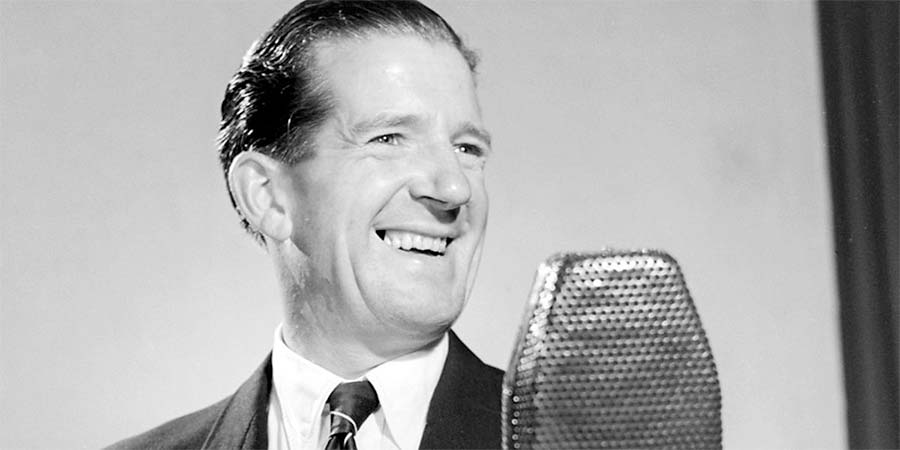
The regular visits started soon after the Second World War had ended, when transatlantic travel became easier once again. His first known trips to the local theatre during this period were in 1948/49 to see Cinderella, which on this occasion starred the Liverpool-born, Jack Benny-style comedian Ted Ray, and then in 1950/51 to watch Humpty Dumpty, which featured Freddie Frinton. Frinton, in particular, became one of Grant's favourites because of his mastery of physical comedy and, especially, his remarkable skill (in spite of being a teetotaller) for playing staggering, stumbling drunks.
The next notable highlight came in 1958, when he saw an old friend, Richard Hearne, topping the bill in Aladdin. Best known since the 1930s for his 'Mr Pastry' character, a bumbling old man with little round glasses and a snow-white walrus moustache, Hearne had gone through the same kind of acrobatic training as Grant (as well as their old mutual friend Ballard Berkeley, best known today for playing the Major in Fawlty Towers), and, ever since their first encounter many years before, they had regarded each other as kindred comic spirits.
Ranking him publicly alongside the likes of Chaplin, Cantinflas, Marcel Marceau, Jacques Tati and Fernandel as one of the 'greatest pantomimists of our day', Grant had never tired of championing Hearne in America, and had been instrumental in arranging for him to make the first of what would become a series of high profile appearances on The Ed Sullivan Show in New York.
Watching him now up on stage in his hometown of Bristol, Grant was moved to reflect on how much similar his own career might have been had his good looks not led to a life as a romantic leading man rather than a comic character actor. The physical skill was still evident in his own screen performances - no similarly suave Hollywood star was anywhere near as adept at executing pratfalls, somersaults and other acts of athleticism - but he was sometimes frustrated that the full range of his talents were rarely glimpsed in the roles that he was given. Richard Hearne thus always made him feel somewhat nostalgic for the days when, as plain old Archie Leach, he excelled at the same kind of routines.
He felt much the same early in 1961, when he spent some time with George Formby, the star of that season's production of Aladdin. Not only had Grant known and admired Formby for many years, but he had also studied, at close hand, the performances of the Lancastrian comedian/singer's father, George Formby Snr (otherwise known as 'The Wigan Nightingale'), from the times when he was a teenager touring the English music halls alongside him. Their shared memories, as a result, were unusually rich and colourful.
It was thanks to Bristol's pantomimes that Grant was not only able to be reunited with old friends like Hearne and Formby, but also discover a new breed of British comedians. In 1962, for example, he saw Bruce Forsyth for the first time when the performer, fresh from his success as the host of Sunday Night At The London Palladium, appeared at the Hippodrome in Turn Again Whittington.
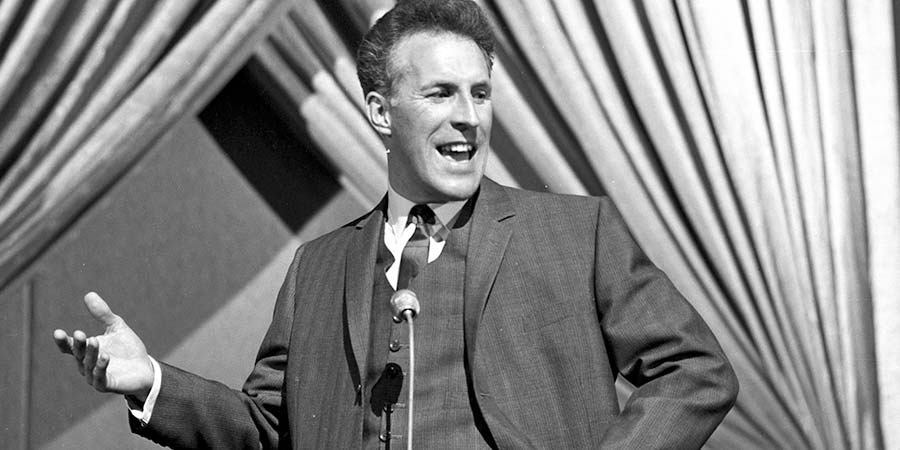
Grant would stay in touch after they met backstage, offering words of advice and encouragement whenever he felt they were needed, and in 1979, when Forsyth embarked on a short tour of the US with his one man show, Grant showed his support by attending the Los Angeles performance. 'What a lovely man he was,' Forsyth would say, 'and what a boost it was to think he liked you.'
Another new, and even deeper, friendship was kindled early in 1964 when Grant returned to see Sleeping Beauty and, for the first time, watched Morecambe & Wise in action. The big and elaborate production was the most popular at that venue in years, breaking box office records as people flocked to see the two stars who, thanks to the burgeoning success of their TV shows, were now in the process of establishing themselves as the biggest comedy act in Britain.
Eric appeared in the production as the King, with Ernie as Presto the jester. They were very relaxed and extremely confident in the way that they controlled the content of the whole show (this was the second consecutive year they had been part of this particular panto, having appeared in it the previous Christmas in Liverpool, and so by now they knew precisely how best to play it), and they neatly blended some of their tried and tested TV routines (including the 'Boom Oo Yata-Ta-Ta' song) with a few specially-written sequences.
Grant loved them both, greatly admiring them as a double act, but Eric Morecambe, in particular, captivated him. He loved the subtle precision of his timing, the power of his personality, his improvisational abilities and, perhaps most importantly of all, his pure comic charm.
When he went backstage to congratulate the pair of them, he struck up a special rapport with Morecambe more or less immediately, and the two men would go on to develop a deep sense of mutual affection and respect that would remain strong for the rest of their lives. There was, indeed, more than a grain of truth in the later observation by Ernie Wise (who, somewhat enviously, watched the friendship blossom from not too far away), when he reflected: 'The thing about Cary Grant was that he would have loved to have been Eric Morecambe, and the thing with Eric was that he would have loved to have been Cary Grant.'
Eric Morecambe, of course, once responded to the question, 'What would Morecambe & Wise have done had you flopped in show business?' with the tart remark: 'We'd have been Mike and Bernie Winters.' Cary Grant would actually go on to see the latter double act early in 1969, when they were in Bristol as the stars of Cinderella.
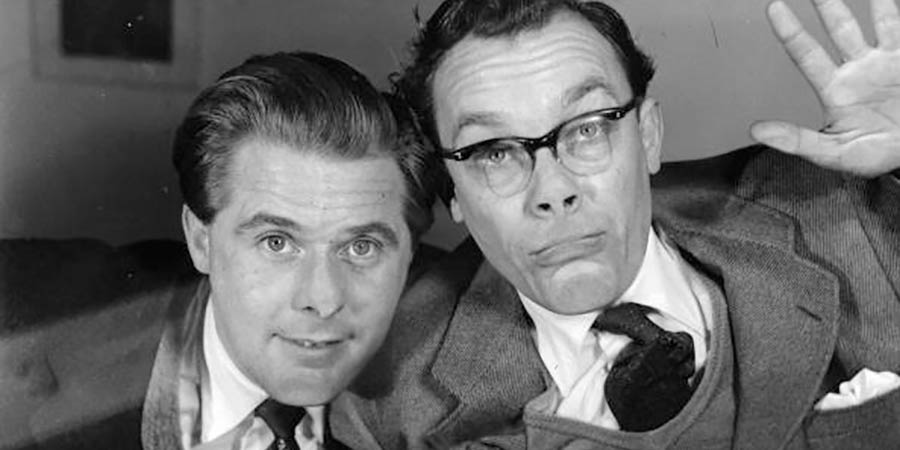
Grant, at sixty-five, was now retired from making movies, and, having already been married to and divorced from his fourth wife Dyan Cannon, he had a little more time than before to spend in his favourite city, flying over about every two months to see his mother (who by this stage was living in a private nursing home, The Chesterfield, in Clifton), as well as continuing his annual visits at Christmas to the Hippodrome. He was not familiar with this year's two stars, but, as usual, he was keen to discover what they were like.
Mike and Bernie Winters, however, were never likely to impress Cary Grant. Unlike Morecambe & Wise, who had already shaken off their early American influences and evolved into something much more intimately and amusingly English, the Winters brothers still had a style that owed much to the likes of Abbott and Costello and Martin and Lewis, and, as someone who actually knew Abbott and Costello and Martin and Lewis, Grant could only see them as a vastly inferior version.
There was one moment during their performance, however, that did cause him some mild amusement. They liked to do a few impressions of old Hollywood stars from the 1930s and 40s (what the more self-aware Tony Hancock, who used to do a similar routine, liked to introduce as: 'Here's one for the teenagers'). The pièce de résistance, as far as they were concerned, was when Mike Winters, who rather fancied himself as a debonair leading man, did his hapless impersonation of his hero Cary Grant, full of throaty 'Judy, Judy, Judy's - oblivious of the fact that the man himself was sitting just a few rows back, watching him all the time.
Grant was compelled to go backstage after the show was over and say with a smile: 'You know, Mike, that was the worst Cary Grant impression I ever heard!'
He would have a much more satisfying experience the following year when he returned, in March 1970, to take in the hugely successful production of Aladdin that starred the comedian Freddie 'Parrot Face' Davies as Wishee Washee. It was an unusually important occasion for Grant because he was bringing along his four-year-old daughter, Jennifer, for her first experience of an English pantomime, and was keen for her to start off with something that would enchant her as much as his own first visit had enchanted him.
It proved a good choice. Lavishly staged, the show was colourful, fast-moving and full of surprises, with plenty of lively musical and comedy routines, eye-catching costumes, surprising technical tricks and spectacular ensemble scenes. It also had the droll Freddie Davies, a crafty master of comic silliness, who was certainly unlike anyone Jennifer had ever seen before.

The most distinctive part of Davies's act were the frenetic routines he would do, partly as himself or another 'straight' character, and partly as the Homburg-hatted, squashed-eared, saucer-eyed, slushily-lisping Samuel Tweet (imagine a cross between Victor Meldrew, Lee Evans and Sylvester the cat), whose chronic bad luck with his ailing 'boodgies' and a succession of less-than-honest pet shop owners caused him all kinds of frustrations and distress ('I'm thick, thick, thick up to here!').
When Davies heard via a member of staff that Cary Grant was coming to the next matinee performance along with his daughter and her nanny, and had politely requested permission to come round and meet him after the show, he almost fell off his dressing room chair. Thrilled at the prospect of meeting one of his idols, he told his road manager, an eccentric character called Percy (who only had one hand and spoke with a Scottish accent even though he hailed from Chorley), to tidy up the area and then make himself scarce - and Davies reminded him that, if he was to bump into the great man, he should make sure to address him respectfully as 'Mr Grant'.
Davies actually got to meet Jennifer Grant first, because the pantomime had a scene in which he would invite six children from the audience to join him on stage and sing a song with him, after which he presented each one of them with one of his trademark Homburg hats. On this particular occasion, while five of the pale-faced children announced that they had come from various districts in and around Bristol, the last little girl, sporting a healthy-looking suntan, startled him by volunteering in a clear and loud voice that she came from 'Beverly Hills, California'.
When the show was duly over, and Davies was back in his dressing room, Percy was still loitering there when a knock came at the door. Popping his cigarette in his mouth to free his only hand, Percy wandered over and opened up, looked the star up and down and then said nonchalantly, 'Hello, Cary'.
'He was lovely to meet,' Davies would later recall of the encounter, 'charming, very natural and absolutely sincere. We chatted about the show and he made some very nice comments.'
They would meet again more than a decade later, when Grant was in London to attend a charity ball, held by the Water Rats, at the Grosvenor House Hotel. As soon as he saw Davies, he beamed at him and said, 'My daughter still has the hat!'
Grant was back in Bristol yet again in January 1972 to see the latest production of Dick Whittington, which on this occasion starred the former lead singer of the recently disbanded Herman's Hermits, Peter Noone. Never much of a fan of pop music, Grant, as usual, was more interested to see the comedian on the bill, who this year was Roy Hudd.
He actually first saw him, by accident, before he even reached the Hippodrome. Hudd, like many other members of the company, was staying for the duration in a flat attached to the nearby Clifton Hotel. One Monday morning, after taking a weekend break, he went to the reception desk and saw a cake there with the iced inscription, 'Lovely to have you back in Bristol'. Amused, Hudd said, 'You shouldn't have bothered - I've only been away one day!' The receptionist looked at him pityingly and said, 'It's not for you. It's for him,' and pointed at a tall and beautifully dressed figure standing by the bar. It was Cary Grant.
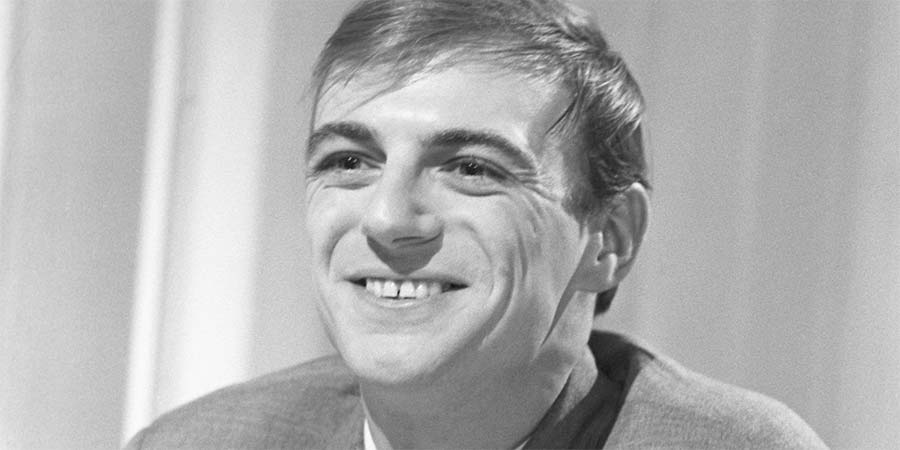
Star-stuck, Hudd walked over to him. 'You don't know me, Mr Grant,' he stammered. 'But I must thank you for so many, er, laughs, so many, er, brilliant performances, well, really, for, er. Oh yes. Thank you very much.'
Grant then surprised him by replying: 'I do know you. You're Roy Hudd and you're in the pantomime here. I'm coming to see it tonight.' Hudd could only smile and stare as the star continued: 'It's good to meet you. Will you have a snort with me?' They then sat down and had a malt whisky together.
Later that day at the Hippodrome, after the matinee was over, a wide-eyed Peter Noone rushed over to Hudd and exclaimed: 'You'll never guess who's coming in tonight! Only Cary Grant, that's all!' Hudd, sensing the prospect of a prank, affected the most phlegmatic of expressions as he replied: 'Oh really? I know him'. Noone laughed it off as a joke, as did every other member of the cast who elicited the same matter-of-fact response.
Soon after the curtain came down that night, everyone except Hudd gathered expectantly in Noone's dressing room as they waited for the VIP to arrive. Once he did indeed enter, and was being greeted excitedly by all of those present, Hudd, who had been hiding patiently nearby, strolled in as if nothing was out of the ordinary. 'Hi Roy!' said Grant. 'Hi, Cary!' Hudd casually replied.
As everyone else's face froze in shocked disbelief, the two men started chatting as if they were old friends. It was, Hudd would later recall, 'the greatest moment of my life in show business'.
Grant's annual visits to the Hippodrome during the panto season were now so well-known in show business circles that some performers, who had grown up as firm fans, would make a point of choosing Bristol as a seasonal location purely in the hope of meeting him there. One star who did so was Ronnie Corbett, who, when offered the options of Manchester or Bristol for the 1972/3 production of Cinderella, opted for the latter because, as he said to his wife, 'You never know, Cary Grant might visit his mother at Christmas and pop in and see the show'.
His gamble paid off. One day in January, while he was resting in his dressing room after the matinee, Corbett was visited by an extremely excited-looking theatre manager, who informed him, somewhat breathlessly, that Cary Grant's secretary had just called, explaining that Grant had booked seats for the evening's performance, and he wondered if it would be all right if he came round afterwards for a drink.
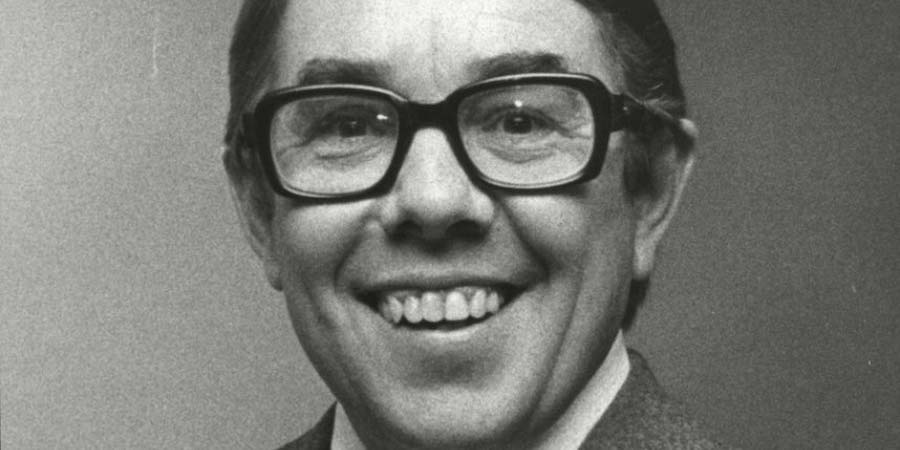
Corbett could hardly believe it, but, sure enough, his dressing room door opened after the performance and there stood a beaming Cary Grant, looking, Corbett was delighted to find, 'exactly just like you would expect Cary Grant to look'. Corbett, after a few seconds of stunned immobility, welcomed him in, handed him a gin and tonic and then spent a memorable half an hour or so being charmed by his hero's fond reminiscences about Bristol, Britain and the funniest performers he had known and loved. Once again, Cary Grant had made a comedian's day.
It would, however, prove to be the last of Grant's regular visits to the venue. His mother died just a few weeks later, on 22 January, at the age of ninety-six, and there was no longer such a strong reason for him to return to the place of his birth.
There would still be occasional trips back to Bristol, usually for business or charitable reasons, but, following the loss of his mother, they were now bitter-sweet occasions, and rarely lasted long enough for indulging in any leisure. He still loved following British comedy, but from this point on it was usually from more of a distance.
What Cary Grant left behind, however, was a kind of secret history of his involvement in the humour of his homeland. For about a quarter of a century, he kept coming back to the Bristol Hippodrome to applaud old favourites and encourage new friends. Without any fuss or fanfare, he let so many grateful British comics know that, as they say in pantomime, he was, and would remain, behind them.
Help us publish more great content by becoming a BCG Supporter. You'll be backing our mission to champion, celebrate and promote British comedy in all its forms: past, present and future.
We understand times are tough, but if you believe in the power of laughter we'd be honoured to have you join us. Advertising doesn't cover our costs, so every single donation matters and is put to good use. Thank you.
Love comedy? Find out more
